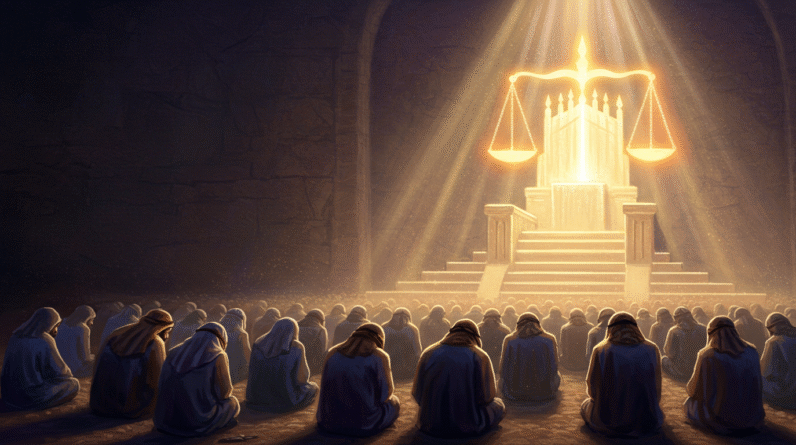God’s Justice In Judgment (Psalm 9:8)
You’ve likely come across the phrase that sums up a great truth: God is just. Psalm 9:8 puts it plainly and powerfully: “He rules the world in righteousness and judges the peoples with equity.” Psalm 9:8. As you open this study, know that you’re stepping into a subject that has comforted and challenged God’s people through the ages. You’ll see how God’s justice and His love are not at odds; they are two sides of the same character. This article will guide you through Scripture, offering lessons for your life—teaching you how to balance compassion with righteousness, mercy with truth, hope with accountability.
Understanding Psalm 9:8
When the psalmist declares that God “rules the world in righteousness,” he’s inviting you to trust that God’s governance is moral, wise, and steadfast. The second phrase—“judges the peoples with equity”—assures you that God’s judgments are fair and impartial. These are not abstract concepts; they describe who God is and how He acts among nations and individuals. You’re being reminded that there is moral order in the universe because the One who holds it together is perfectly righteous. For parallels that deepen your understanding, consider Psalm 89:14, which says that righteousness and justice are the foundation of God’s throne Psalm 89:14, and Deuteronomy 32:4, which proclaims God’s deeds to be perfect and all His ways just Deuteronomy 32:4.
The language of “righteousness” and “equity”
You ought to notice the careful word choice in Psalm 9:8: righteousness points to God’s moral perfection; equity points to His fairness in judgment. This means God measures with truth, not emotion or favoritism. When Scripture says He “judges the peoples,” you’re not looking at a distant ruler who is indifferent. You’re seeing a King who rules with steadfast justice and who takes into account every heart and every circumstance. That’s why Hebrews reminds you that nothing is hidden from God’s sight—He knows your secret thoughts and motives Hebrews 4:13. When justice is dispensed by such omniscience, you can trust it as righteous and equitable.
Justice and God’s unchanging character
If you’re concerned about inconsistency—why sometimes evil seems to prosper—you must remember that God’s justice is rooted in His unchanging character, not in shifting human standards. Deuteronomy identifies God as faithful and just in all His ways Deuteronomy 32:4; Exodus highlights His compassionate, gracious nature even as He is just Exodus 34:6-7. That combination of mercy and justice is the thread that runs through Scripture. Knowing this helps you reconcile the tension you sometimes feel between God’s patience and His eventual judgment.
The character of God’s justice
God’s justice is not merely legalistic; it is moral and redemptive. When Scripture speaks of God judging the world, it’s not only about condemnation—it’s about setting things right. The apostle Paul explains that God presented Christ as a sacrifice to demonstrate His righteousness, showing that He is both just and the justifier of those who have faith in Jesus Romans 3:25-26. You must see this truth plainly: God’s justice does not contradict His saving work; rather, His justice is fulfilled in the cross.
Impartiality and universality
One of the most comforting aspects of God’s justice for you is its impartiality. God does not show favoritism; His standard applies to all people. Romans makes it clear that God judges impartially Romans 2:11. Whether you’re rich or poor, powerful or weak, the righteous Rule of God stands. That should prompt humility and self-examination rather than presumption or despair.
Accountability and hope
God’s judgment brings accountability, but it also brings hope. When wrongs are held to account, the righteous can find vindication. The psalmist celebrates that God “upholds the cause of the oppressed” and will break the arms of the wicked [Psalm 10:17-18; Psalm 10:15]—scripture after scripture testifies that God hears the cries of the afflicted and will bring about justice in His time. Trusting God’s timing is hard, but the promise that He will judge with equity gives you a future of moral hope, not mere moral disappointment.
The character of God’s mercy
As you study Psalm 9:8, never lose sight of God’s compassion. Justice without mercy is cruelty; mercy without justice can become license. The Bible shows you a God who is both merciful and just. Psalm 103 declares the Lord as merciful and gracious, slow to anger, and abounding in steadfast love Psalm 103:8. John’s Gospel tells you that God loved you while you were still a sinner—exemplified supremely in the gift of His Son John 3:16. These Scriptures remind you that justice is not the whole story; mercy completes it.
Mercy in the law and the prophets
You’ll find mercy woven into the Old Testament law and prophetic calls. The Lord instructed His people to care for the widow, the orphan, and the foreigner—acts of mercy born from a covenantal understanding that God Himself cared for them Isaiah 1:17. The prophets condemned religious ritual that lacked compassion. Micah famously tells you what the Lord requires: “to act justly, to love mercy, and to walk humbly with your God” Micah 6:8. That balance is essential for your faith and witness.
Mercy demonstrated in Christ
Your ultimate assurance that God is both merciful and just lies in Christ. The cross is where God’s justice and mercy meet. Paul explains that in Jesus, God’s righteousness and forgiveness are displayed together Romans 3:25-26. When you trust Christ, you’re not bypassing justice; you’re receiving its fulfillment in mercy through the Savior.
Justice and judgment in the Old Testament
When you read the Old Testament, you see God’s justice operating at both personal and national levels. Prophets called kings and nations to account because justice is the reflection of God’s rule. Amos declared, “Let justice roll on like a river, righteousness like a never-failing stream” Amos 5:24. Isaiah urged the people to seek justice and defend the oppressed Isaiah 1:17. You should understand that for Israel, justice was an essential part of covenant faithfulness—an outward sign of an inward devotion to the Lord.
Prophetic critiques and social justice
The prophets were uncompromising when it came to social injustice. You’ll find Jeremiah condemning counterfeit righteousness that oppresses the poor Jeremiah 9:24. Zechariah exhorts you to “show mercy and compassion” when you “administer justice” Zechariah 7:9-10. These calls are not merely political; they are spiritual. God expects your faith to produce justice-bearing actions toward your neighbor.
Theocracy and the hope for equity
In the Old Testament, God’s rule often took the form of a theocracy—a system meant to manifest God’s justice in daily life. But you must remember that human authorities fail; hence the longing for a perfect King who would combine justice and mercy in unprecedented ways. That longing points forward to Jesus, who would enact righteous judgment and compassionate salvation.
Justice and judgment in the New Testament
In the New Testament, Jesus clarifies and fulfills what God’s justice looks like. You’ll find both warning and invitation: He warns of the final judgment Matthew 25:31-46, and He extends grace to the repentant and humble Luke 18:9-14. That combination should shape how you live: you are called to recognize the seriousness of sin and the greatness of God’s mercy.
Jesus’ example of mercy and truth
When a woman caught in adultery was brought before Jesus, He did not deny the reality of the law’s demand for judgment, but He also extended forgiveness and called the woman to a transformed life John 8:1-11. You see here how mercy and accountability work together: Jesus did not excuse sin, but He offered a way to newness. That is how God’s justice operates—not merely to condemn, but to restore.
The final judgment and present responsibility
The New Testament speaks clearly of a final judgment where Christ will separate the righteous from the wicked Matthew 25:31-46. You should take this seriously because your present life matters—how you treat others, how you respond to Christ’s love, will bear on your eternal destiny. Yet Paul also instructs you to leave vengeance to God and to live peaceably, trusting God’s righteous retribution Romans 12:19. This tension—active responsibility and patient trust—should motivate both justice-seeking action and humble dependence on God.
Jesus: the perfect judge and Savior
You ought to see Jesus as the one who perfectly embodies Psalm 9:8. He is the righteous King who will judge all nations, and He is the suffering Savior who bore your sins. Revelation paints Jesus as a faithful and true Rider on a white horse, judging and waging war in righteousness Revelation 19:11-16. That dramatic picture emphasizes that Christ’s judgment is inseparable from His authority and purity.
Mercy offered through the cross
While Jesus will judge, He first offered Himself to bear the penalty of sin so that justice could be satisfied and mercy extended. Romans declares this theological paradox with clarity: through Jesus, God is just and the justifier of those who have faith Romans 3:25-26. If you want to be reconciled to a just God, you must come to Jesus, because He reconciles justice and grace on the cross.
The call to repentance and new life
Because Christ’s judgment is real, His call to repentance is urgent. Jesus welcomed sinners and called them to turn from their sins and follow Him. When you respond in faith, you’re not escaping justice by a loophole; you’re entering into the very justice God has provided through the Savior. The gospel offers both rescue from condemnation and empowerment for righteous living.

How God’s justice relates to His love
You may wrestle with how God can be both loving and just. The answer from Scripture is that God’s justice is an expression of His love—He loves what is good and hates what destroys. 1 John tells you plainly that God is love 1 John 4:8, and the Father’s love is displayed in sending His Son to deal with sin Romans 5:8. Love without truth would permit evil to flourish; truth without love would crush the guilty without offering hope. God’s justice, therefore, serves love by confronting evil and making possible genuine restoration.
Redemption as the goal of divine justice
Every act of divine judgment, ultimately, aims at redemption—either bringing offenders to repentance or removing unrepentant evil so that righteous flourishing may occur. The Lord’s desire is that none should perish 2 Peter 3:9, and He exercises His justice in ways that make the offer of salvation possible and meaningful. You can rest in the assurance that God’s judgment, painful as it may be, serves the purposes of a loving and holy God.
Love that disciplines toward blessing
When you think of God’s discipline, remember Proverbs and Hebrews: God disciplines as a loving Father to train and restore Hebrews 12:6-11. Discipline includes correction and consequence, both rooted in God’s desire to see you live the abundant life He intends. His judgments are not capricious—they’re purposeful, designed to bring about spiritual fruit.
Practical Bible study lessons: God’s Love and Justice through Scripture
You’re not only a reader of Scripture—you’re a student and a doer. Here are practical Bible study lessons that will help you balance God’s compassion with His righteousness. Each lesson is meant to be meditated on, prayed over, and put into practice.
- Trust God’s righteous rule. Memorize and meditate on Psalm 9:8 and Psalm 89:14. Let these truths ground your faith when circumstances seem unjust. You’ll find peace when you remember that ultimate justice rests with God.
- Embrace Christ’s atoning work. Study Romans 3:25-26 and John 3:16. Reflect on how the cross satisfies God’s justice and extends His love. This encourages you to approach God with confidence and humility.
- Practice mercy alongside judgment. Read Micah 6:8 and Luke 18:9-14. Ask God to give you a heart that seeks justice and loves mercy. In your relationships and community involvement, pursue fairness while extending compassion.
- Advocate for the vulnerable. Let passages like Amos 5:24 and Isaiah 1:17 move you to action. You’re called to be God’s hands and feet in a broken world—working to correct injustices, care for the oppressed, and defend the poor.
- Pray for justice and mercy simultaneously. Use Psalm 103 and the Lord’s Prayer to shape your petitions. Pray that God’s kingdom would come and His will be done—bringing both righteousness and restoration Matthew 6:10.
- Cultivate humility and repentance. Study Luke 18:9-14 and take time to confess personal failings. God’s justice leads you to transparency and grace, not to self-righteousness.
- Learn how to wait on God. Passages like Psalm 37:7-9 and Romans 12:19 instruct you to resist taking vengeance into your own hands. Waiting on the Lord is an act of faith in His righteous governance.
Each lesson invites you to move from knowledge to character. Bible study is not just about information; it’s about transformation—becoming people who reflect God’s justice and love.
Study questions for personal reflection or group discussion
To help you engage, here are questions you can use in your quiet times or in a small group:
- How does Psalm 9:8 change your view of current injustices you see around you? Psalm 9:8
- In what ways have you seen God’s justice and mercy intersect in your own life or in the lives of others? Consider Romans 3:25-26 as you answer.
- What practical steps can you take this week to advocate for someone who needs justice? Let Amos 5:24 guide your heart.
- How does the cross of Christ help you reconcile God’s love with His righteous judgment? Reflect on John 3:16 and Romans 5:8.
- When you are tempted to take matters into your own hands, how might Romans 12:19 redirect you?
Use these questions prayerfully. The goal is not mere discussion but heart change that leads to action—justice informed by mercy and guided by the Lord.
How to respond to injustice in a God-honoring way
When you encounter injustice, you can respond in ways that honor God’s character. First, bring your grief and anger to God in prayer—He hears and cares Psalm 34:17-18. Second, seek wise counsel and pursue constructive action: legal redress, community organizing, or compassionate service to those harmed. Third, don’t forget the personal dimension—repent where you’ve erred and ask God to show you how to act justly in your own sphere Micah 6:8. Finally, maintain hope: God’s final judgment is sure, and He will make all things right in His time Revelation 21:4.
Choosing patience without passivity
You must avoid two extremes: passive resignation and vengeful activity. Patience does not mean doing nothing; it means acting in ways that reflect trust in God’s righteous timing and means. Paul’s counsel to submit to governing authorities because they bear the sword for God’s purposes Romans 13:1-7 invites you to work through structures God has established, even as you pray for reform where needed.
Common objections and pastoral responses
You may have honest questions: Why does God allow suffering? Why does evil often seem to go unpunished? These are not naive questions, and Scripture wrestles with them honestly. Psalm 73 is one place where the psalmist almost lost faith because the wicked prospered, but when he entered God’s presence, his perspective changed Psalm 73:1-3; Psalm 73:16-17. The Bible never minimizes the pain caused by injustice, but it encourages you to trust God’s sovereign wisdom and to remember that He will one day make all things right.
Why God’s timing differs from yours
God’s delay in executing justice often serves greater purposes—warning, calling to repentance, or working redemptive outcomes you may not perceive immediately. Isaiah assures you that the Lord waits to be gracious to you and will rise up to have compassion if you turn to Him Isaiah 30:18. Your task is to trust Him and to live faithfully while you wait.
When justice seems absent
If you’re tempted to despair because justice seems absent, remember the cross. Christ bore the apparent triumph of evil and turned it into the means of salvation. In Romans, Paul emphasizes that God will “reconcile the world to himself” through Christ Romans 5:10-11. The victory is assured even when it looks contrary to your present experience.
Living out God’s justice in your community
You’re called to be an agent of God’s justice and mercy where you live, work, and worship. That means you’ll engage with structures and relationships with integrity, humility, and compassion. It also means advocating for the weak, speaking truth to power, and offering practical care to those in need. Proverbs says that doing justice brings joy to the righteous Proverbs 21:15. When you act in accordance with God’s heart for justice, you model the reign of Christ and point others toward the King who rules in righteousness.
Church’s role in justice
Your local church should be a community where justice and mercy meet. The early church was known for both doctrinal truth and compassionate ministry. As a member, participate in outreach, support ministry to the marginalized, and hold leaders accountable to biblical standards of righteousness. The church is a visible demonstration of God’s just and loving reign when it cares for the least among you.
Conclusion: Trusting the Judge who loves you
As you reflect on Psalm 9:8 — “He rules the world in righteousness and judges the peoples with equity” Psalm 9:8 — let it shape your devotion. God is not distant, nor is He arbitrary. He rules with a perfect sense of what is right and fair, and He judges with a heart of equity. Yet His judgment is not separate from His love; Christ’s work on the cross shows you how God’s righteousness and compassion meet. You’re called to trust that justice will ultimately be done, to live in the tension of faithful action and patient trust, and to mirror God’s character by loving mercy and pursuing justice in your own life.
If you’ve never placed your trust in Jesus, see His invitation in Scripture: God loves you and has provided a way of forgiveness through Christ’s sacrifice John 3:16; trust in Him for salvation and be transformed by His grace Romans 10:9-10. If you already know Christ, let the truths in this study move you to greater pursuit of justice and deeper compassion—reflecting the One who rules in righteousness.
Explore More
For further reading and encouragement, check out these posts:
👉 7 Bible Verses About Faith in Hard Times
👉 Job’s Faith: What We Can Learn From His Trials
👉 How To Trust God When Everything Falls Apart
👉 Why God Allows Suffering – A Biblical Perspective
👉 Faith Over Fear: How To Stand Strong In Uncertain Seasons
👉 How To Encourage Someone Struggling With Their Faith
👉 5 Prayers for Strength When You’re Feeling Weak

📘 Jesus and the Woman Caught in Adultery – Grace and Mercy Over Judgement
A powerful retelling of John 8:1-11. This book brings to life the depth of forgiveness, mercy, and God’s unwavering love.
👉 Check it now on Amazon
As a ClickBank & Amazon Affiliate, I earn from qualifying purchases.
Acknowledgment: All Bible verses referenced in this article were accessed via Bible Gateway (or Bible Hub).
“Want to explore more? Check out our latest post on Why Jesus? and discover the life-changing truth of the Gospel!”








